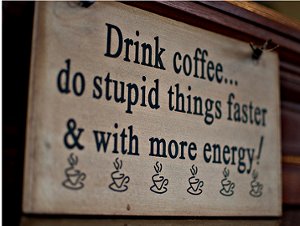Efter flere natter med for lidt søvn, havde jeg i går svært ved at gøre det jeg vil. Og det irriterede mig resten af dagen. Jeg kunne ikke tage mig sammen og næsten alt min tid gik til en undersøgelse af e-bog readers og Goodreads.
Jeg skrev i det sidste øjeblik min 30 minutter fokusskrivning og det blev ikke særlig interessant. Altså, det var fra den forkerte stemning, teksten jeg skrev kom ikke fra mig selv, men inspirationen kom alt mulige andre steder fra.
Her til morgen tænkte jeg også på Goodreads (skal jeg tilmelde mig og bruge tid på det?) og for eksempel blogposts. Men jeg var mere vågn i dag og klar over at det er enormt vigtigt at jeg holder fast i 30 min fokusskrivning, som aller første på dagen.
Det er dog morgenmaden som er det store problem.
Jeg kan godt lide at sætte mig bag computeren, starte den – sådan at den har tid til at gøre hvad den skal gøre – og langsomt lade mine tanker glide hen over alt som dukker op, sådan at jeg begynder at koncentrere mig på hvad jeg skal skrive.
Men computeren og jeg er meget hurtigere færdigt end min morgenmad er spist, så jeg spiser videre mens jeg… ja.. hvad skal jeg lave… jeg kan lige slå noget op, eller se på den fane som er åben…
Og det er altid interessant, og inviterer til mere – det går fint, og på den måde kan der godt forsvinde en time (eller mere). Så kommer jeg i en anden stemning og skriver om noget som er direkte kommer af indflydelser udefra.
Men jeg har et meget dejligt værelse til at skrive i, med to lænestole og et kaffebord. Så jeg burde sikkert spise min morgenmad på en stol. Og først når jeg er – endeligt!- færdigt, kryber jeg bag skærmen og starter med de samme i Zim. Det vil være meget bedre.
Jeg husker at Dani Shapiro ofte har sagt og skrevet (hun har sagt meget om procrastination, her for eksempel), at det vigtigste punkt på dagen for hende er gangen fra kaffemaskinen til hendes computer. Jeg tror hun referer til afbrydelser fra for eksempel telefonen som kan forstyrre hende. Men hun indrømmer også at internet er en stor fjende af hendes skrivedisciplin, så også for hende er det vigtigt at have en vaner og rutiner på plads.
Jonathan Franzen har sagt at han arbejder på en computer uden internetforbindelse. Det er en glimrende ide at have det slukket, i hvert fald om morgen.
Jeg har ikke noget imod gode indflydelser, og der findes der ufattelig mange af via nettet, det er fantastisk, det er dejligt. Men hvad hjælper de fineste sætninger fra en klog og godt menneske, når man ikke er nået til nogenlunde det samme punkt i sit liv? Man skal leve sit liv så godt som man kan, og der kan nogle visdomsord fra andre godt komme på det rigtige tidspunkt. Så kan man tykke på det og omsætte det i ens eget liv. Men man har ikke brug for at hurtigt, uden rigtig sammenhæng, læse de klogeste ting eller smukkeste sætninger, når man selv er et helt andet sted hen i livet og døjer med helt andre problematikker. Så er det spild af energi, lige der på det tidspunkt. Og når man slukker for stort set alt tilførsel af informationer, får man – især i vores tid – mere end nok i ørerne og under øjnene alligevel. Det sker af et eller andet grund.

